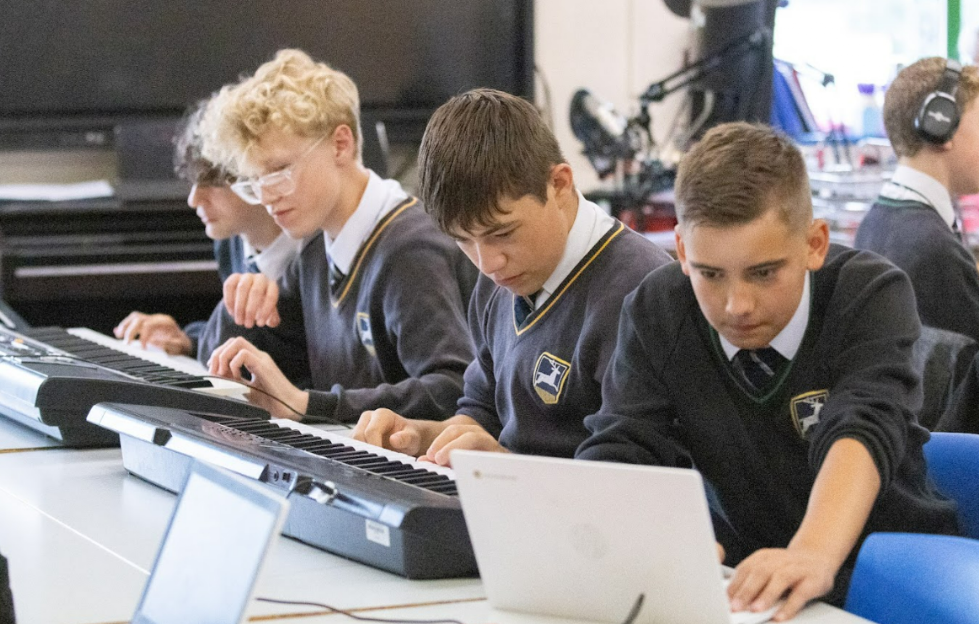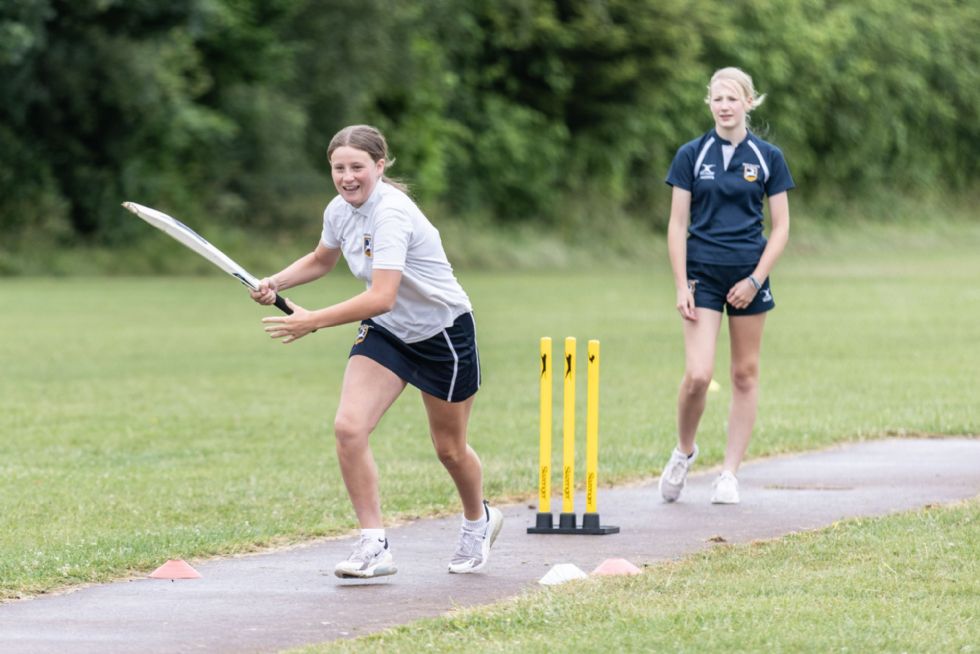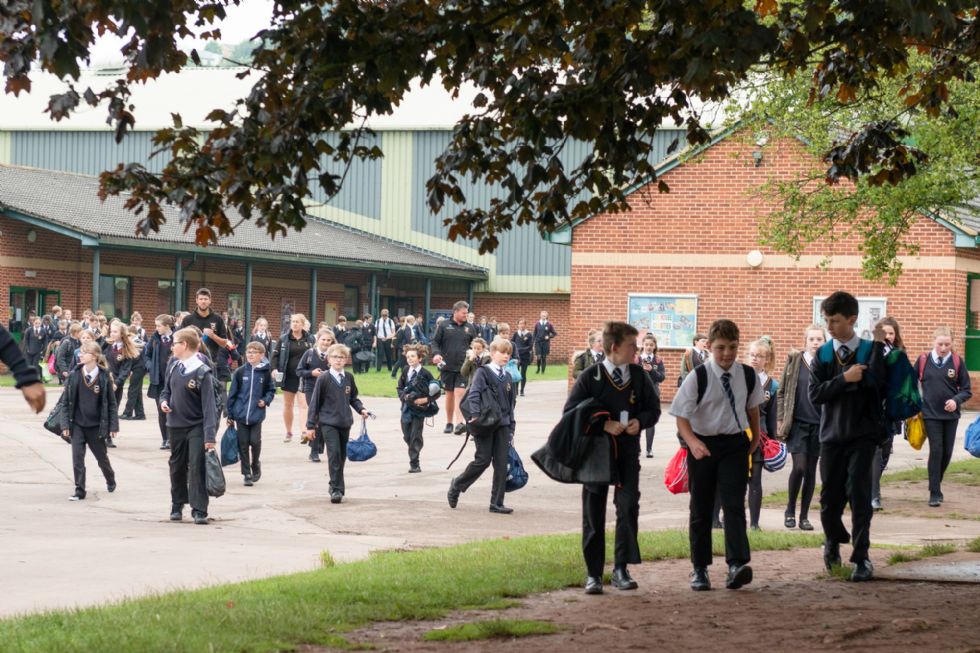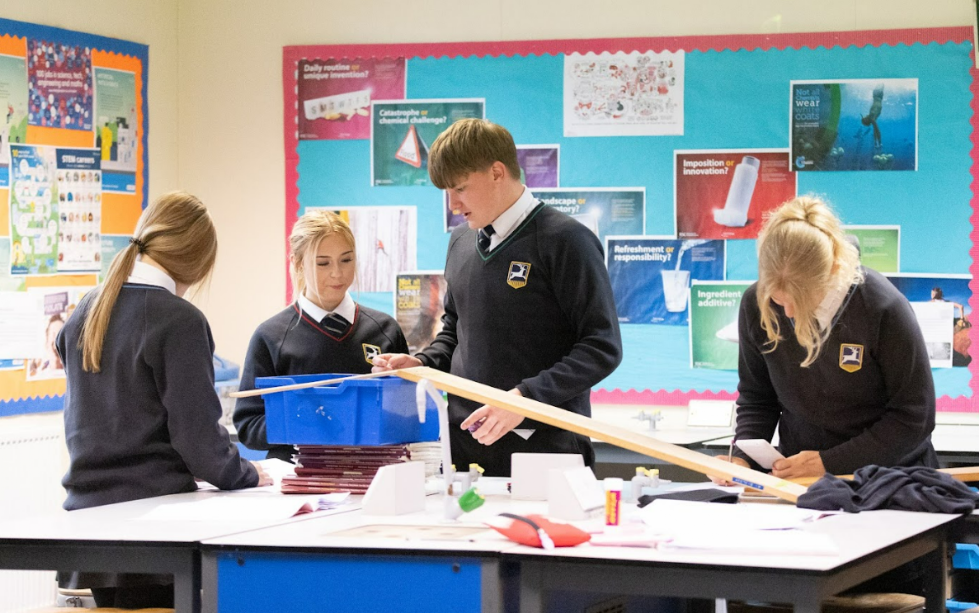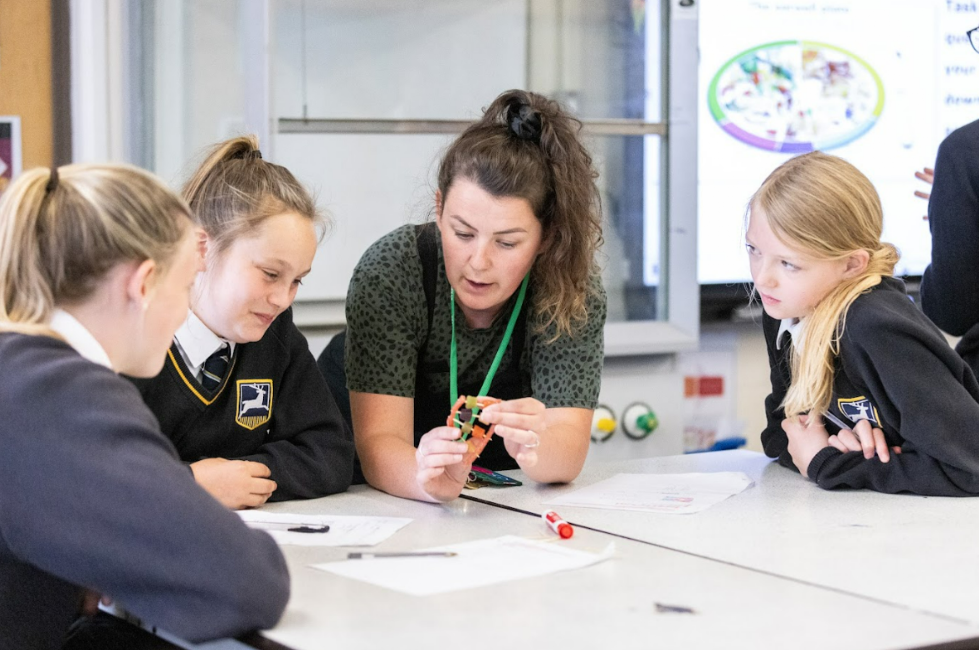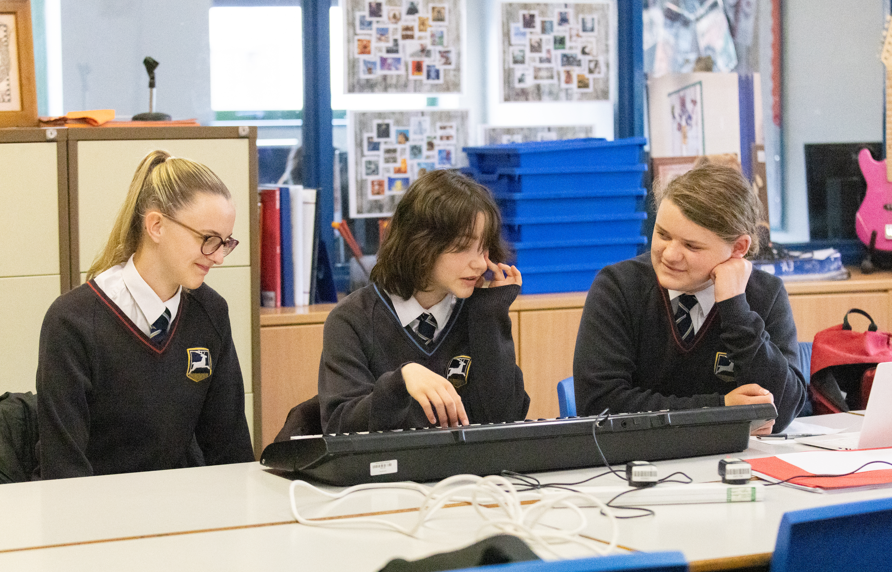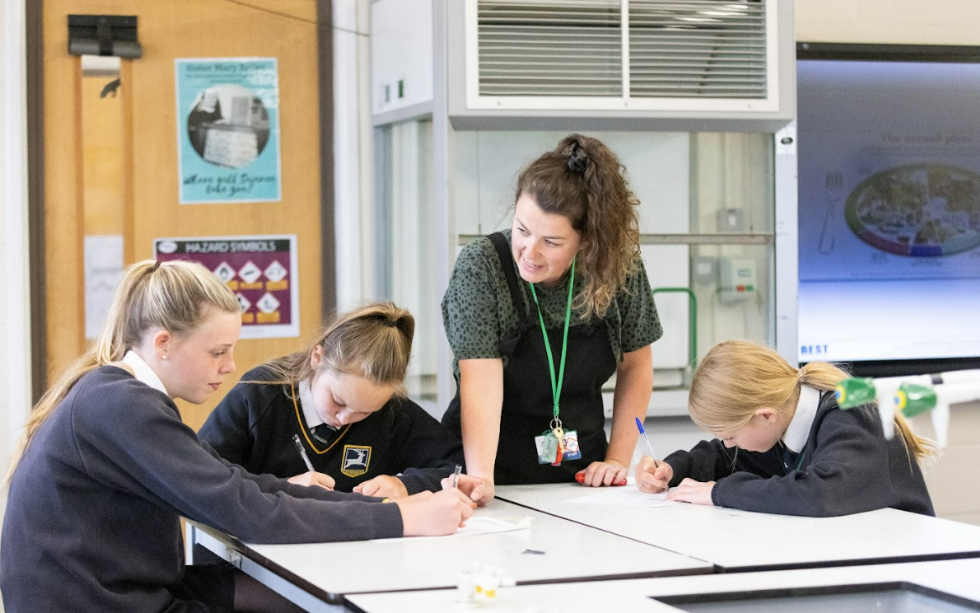SEND Offer
SEND School Offer – Dene Magna School.
Introduction
Dene Magna School is an 11-16 co-educational Academy serving the Forest of Dean and surrounding communities. Dene Magna School offers Key Stage 3 (11-13 years) and Key Stage 4 (14-16 years) curriculum.
The Learning Support Department at Dene Magna school works to support those children who have Additional Learning Needs (ALN) and in close liaison with the school’s Pastoral Support System those children who experience Social, Emotional and Mental Health Difficulties.
Identification of those children with ALN
Dene Magna’s Learning Support Department works closely with Year 6/7 pastoral support teams to identify incoming Year 7 children who have ALN and who may require additional educational or pastoral support. Members of the Learning Support Department and the Year 6/7 Pastoral Team visit all of Dene Magna’s partner primary schools to speak to primary school colleagues and to gather information and data about each and every child joining the Dene Magna community. Moreover, during Dene Magna’s Induction week (June of each academic year), Year 6 children sit the Cognitive Abilities Test (CATs). The CATs test consists of three distinct subtests: Verbal, Quantitative and Non-Verbal.
Verbal: a test to assess a child’s reading and writing skills.
Quantitative: This is to assess a child’s number and numeracy skills.
Non-Verbal: this is to assess processing and problem-solving skills.
CATs test scores of 85 and below are nationally recognised as an indicator that a child may find some aspects of learning challenges. Children who score 85 or below are entered into the school’s SEN Register and are considered for some Literacy/Numeracy support. A child who has a significant discrepancy between CATs Verbal and Non Verbal scores may experience Specific Learning Difficulties (SpLD) and further investigative assessment may be warranted.
Reading and spelling tests are also administered to Year 6 children during Induction Week to ascertain a child’s reading and spelling age. A child’s reading and spelling Standard Scores are also ascertained. Students who present as having a reading and spelling age in arrears of their chronological age are prioritised for Literacy Support (see below). Dene Magna School uses Accelerated Reader to track the progress of readers. Students are supported in all stages of their reading and rewarded for the progress they make.
Year 7 children are retested in February and July and updated reading and spelling ages are published to all teaching staff and the Teaching Assistant team. Information from Accelerated Reader is published to tutors and available for parents throughout the year. All students at Dene Magna have access to quiet reading facilities and lessons and our library is modern, fully stocked and welcoming.
Social and emotional needs are catered for via the school’s Student Support Mentors (SSM) and parental contact.
External (public) Examination Access Arrangement
Students with a Verbal CATs score of 85 or below or who experience poor processing skills or particularly slow handwriting skills may qualify for additional support to enable them to access public examinations.
Additional support may include:
- 25% additional time allowance.
- the support of a reader
- the support of a scribe
- the support of a prompter
- rest breaks
- the use of a word processor.
Identified children are tested at the end of KS3 in line with JCQ exam regulations to determine what, if any, additional support a child is entitled to.
Furthermore, students with diagnosed SpLD, regardless of their CATs scores will be put forward for Access Arrangement testing in the manner described above.
An Additional Needs Pen Portrait outlining a child’s ALN is written for all children who have significant ALN. A Pen Portrait also suggests strategies which may be employed by teaching staff and others to enable a child to overcome their ALN. Additional information suggesting strategies to overcome specific ALNs can be found within SEN Fact Sheets which are located in Shared Documents in the SEN Section. Suggested strategies are intended to help to teach staff to implement differentiated learning tasks. Additional Needs Pen Portraits are updated on a regular basis and staff are alerted of and directed to updated Pen Portraits. Children who are in receipt of an Education Health and Social Care Plan (EHC) or who are Looked After Children (LAC) are allocated a Key Worker who meets the child on a termly basis to discuss “What Went Well” and “Even Better If”. These questions are intended to guide a structured dialogue during which barriers to learning and additional support needs are identified. Key Workers attend all EHC and LAC reviews and play a pivotal role during a child’s Dene Magna School career. A Key Worker is the champion of a particular student(s) and provides the necessary reassurance and voice for the student to ensure that a child’s experience in mainstream classes is a wholly positive one.
The role of the teaching staff
The new Special Educational Needs Code of Practice states clearly that it is the classroom teacher who is responsible for the progress and development of every child in their classroom and each and every child will gain access to the curriculum via differentiated teaching. Staff are updated on a weekly bases (via a briefing) on changes in situation or needs for key students and changes to the pen portrait are communicated with staff via our HLTA team.
Expertise
The SENCO has the required national award for SEN and was previously a SENCO in her school (from 2013). As a trained Primary School teacher, Our SENCO has expert knowledge of the transition process and has worked with staff, students and parents to develop the most in-depth understanding of the needs students with ALN face when they move from KS2 to KS3. She has led INSET for staff on transition, changes to the new SEND code of practice and led her team of experienced HLTAs in their deepening of staff knowledge about meeting the needs of students with ALN. Our SENCO is a serving member of the school Leadership Group and is very much at the heart of policymaking.
Dene Magna has one Learning Support teachers with SpLD qualifications and she provides support for students, as well as testing to ensure we can meet the needs of students. Dene Magna’s Higher Level Teaching Assistants assist with the day to day management of Dene Magna’s TA team. One of the HLTAs is responsible for the well-being of those students with a physical or sensory impairment; a second co-ordinate all Access Arrangements; a third is responsible for writing TA timetables whilst a fourth is the RAIS (Raising Achievement in School) Co-ordinator. RAIS is the school’s Inclusion Unit (see Inclusion Unit policy for further information about RAIS). Our team of well qualified TAs – all of whom have the minimum NVQ Level 2 in Supporting Teaching and Learning (or are working towards this qualification) – are dedicated to their work and many of them have specialist strengths and qualifications (such as the management of students on the Autistic Spectrum). Dene Magna is a designated Teaching School and as such our HLTAs run on an annual basis an eight-week introductory course in the work of a secondary school TA. All HLTAs and TAs are appraised each year through the schools Performance Management Review process and individual targets are set for each HLTA and TA. Dene Magna’s Attendance and Careers Officer helps to co-ordinate the transition process from KS4 to post 16 education, whilst a Case Responsible Officer from Prospects ensures all students with an EHC move smoothly to post 16 education or training, the transition process beginning in Year 9. The school has well established strong links with the Advisory Teaching Service (ATS) and with the Educational Psychology Service. Both of these organisations are available to the school which calls upon them to provide advice about support and additional intervention for particular individuals or to provide ad hoc in-service training (INSET).
Educational Support for those children with ALN
Once we have sufficient data to inform our thinking we provide the following SEN interventions. A child may be in receipt of some or all of the following support interventions dependent upon need:
- In class TA support (either 1:1 or in departments). Dene Magna School is currently completing a full review of the best use of Teaching Assistants in line with recommendations from the DISS Report and the work of MITA. All Teaching Assistants are given comprehensive staff training to allow them to meet the needs of students
- Pastoral support provided by the school’s House Teams (Head of House, Student Support Mentors and Tutors)
- Membership of KS3 Literacy Support group (this necessitates a student being disapplied from French in order to attend additional Literacy classes).
- Small group or 1-2-1 Literacy Support.
- KS3 Independent Learning Task (ILT – homework) support delivered by TAs during lunchtimes.
- Small group Numeracy support.
Parents are consulted about each of the above interventions prior to implementation.
Students with ALN who are in receipt of the Pupil Premium
Some of our students with ALN are also in receipt of the Pupil Premium. Dene Magna School works relentlessly to ensure that these students make at least as good progress at students not in receipt of the Pupil Premium.
Dene Magna School has a Pupil Premium Champion Lead as well as a non-teaching Pupil Premium Champion. They work in partnership with parents and students to ensure that needs are met and that excellent progress can be made. Progress, attendance and behaviour are all tracked regularly and there are clear strategies to support students. Dene Magna School publishes the impact of Pupil Premium provision on its website. The work of the Pupil Premium Champions is aided by the Leadership Group as well as the pastoral team.
Support for students who find it difficult to conform to acceptable expectations of behaviour
Dene Magna School operates a Behaviour for Learning policy. Click on the link below for further information. There is an expectation that our school rules are followed and pre-determined consequences result if they are not, which are implemented on an incremented basis. Children who exhibit behaviour which the school regards as a cause for concern are supported by staff. Individual children are discussed at the weekly Heads of House meeting which is chaired by the Assistant Headteacher (SSG) and attended by the heads of House, Student Support Mentors, Attendance Officer, Inclusion Unit Co-ordinator and SENCO. Some children are withdrawn from some mainstream classes to spend a period of time in RAIS, the school’s Inclusion Unit, for a period of therapeutic support. In all matters concerning student behaviour and Social, Emotional and Mental Health disabilities there is close liaison between the parties mentioned above, who may also call upon the support of expert outside agencies. The ultimate aim is to remove barriers to learning and to enable a student to regain social and emotional equilibrium. Behaviour choices are tracked via our School Information System and merits/rewards are given for positive actions. Students’ Approach to Learning (ATL) is also recorded six times per academic year and helps identify those students in need of praise or support.
Monitoring
In addition to monitoring the social and emotional wellbeing of our students via our pastoral system, our student’s academic progress is recorded six times a year. Each record of a child’s academic progress is known as an “Assessment Point” (AP). By monitoring the APs we are able to see if any of our students are not making expected progress and instigate additional interventions to ensure that they do. Parents have electronic access to all APs (see above for monitoring of reading and spelling progress). Dene Magna School encourages parent contact over progress and works in partnership to meet the needs of students.
How do we prepare our school to welcome and support SEND children and how do we arrange and support a transfer to another school/education establishment?
The transition from KS2 – KS3:
- SENCO attends all Year 5 and 6 EHC review meetings.
- SENCO/HLTAs/ Student Support Mentor attends all ATS Transition Conferences of all vulnerable students or those with ALN.
- Primary liaison meetings with partner primary schools discuss the transition process in relation to the needs of vulnerable children and design bespoke transition arrangements as and when required.
- Lesson observations of vulnerable/ALN children.
- Meetings with individual parents of KS2 children.
- Participation by selected children in “Summer Challenge” activities.
- Head of House, Headteacher, Student Support Mentor and SENCO visit all partner primary schools to gather information about each child prior to (and after) the child’s 5 days Induction Week at Dene Magna.
- Pen Portraits of all Year 6 children distributed to staff prior to Year 6 Induction Week.
- TA support for all Year 6 classes during Induction Week itself.
- Parents Evening held prior to Induction Week to outline the plan for the week and meet individual parents where needed. During Induction Week there is a parents evening which parents have the opportunity to meet all staff (including the child’s tutor) with whom the child will have contact from the beginning of the academic year.
KS à KS4
- ALN students receive additional support with the GCSE options process from Student Support Mentor, SENCO, Assistant Headteacher (SSG) and Deputy Headteacher.
- Individual interviews with Prospects Advisor for ALN students.
- Alternative curriculum paths available to ALN students including bespoke courses delivered by GLOSCOL and other agencies.
- Key Stage 4 à Post 16
- Taster and Link days at college and skills/career festivals.
- Apprenticeships for ALN students sought/supported by Head of Careers and KS4 Student Support Mentor.
- Support for ALN students for the writing of their college place/Apprenticeship.
- Support for those who do not get the required GCSE grades to find an alternative college/work placement.
Where can you find our SEND policy?
Access to our latest SEND policy can be found on the school website.
What is the role of the SEND governor?
Mrs Louise Holland is the SEN governor at Dene Magna. She liaises with the SENCO to ensure the Learning Support Department continues to provide rigour and challenge and to ensure all SEND students are supported in order to maximise their potential. She represents the Learning Support Department at governors meetings.
What do you do if you are not happy?
Please do not hesitate to contact the SENCO or the Headteacher.


